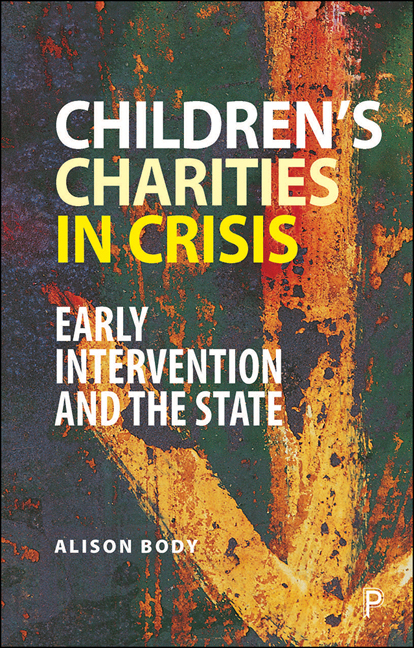Book contents
- Frontmatter
- Dedication
- Epigraph
- Contents
- List of Figures and Tables
- About the Author
- Acknowledgements
- Introduction
- Part I Preventative Services and Children’s Charities: Policy and Paradigm Shifts
- Part II On the Frontline of Early Intervention
- Part III The Lived Realities of Commissioning Children’s Early Intervention Services
- Part IV Concluding Thoughts
- Appendix: Data and Methods: Voices from the Frontline
- References
- Index
8 - The Action Imperative to do Things Differently?
Published online by Cambridge University Press: 04 March 2021
- Frontmatter
- Dedication
- Epigraph
- Contents
- List of Figures and Tables
- About the Author
- Acknowledgements
- Introduction
- Part I Preventative Services and Children’s Charities: Policy and Paradigm Shifts
- Part II On the Frontline of Early Intervention
- Part III The Lived Realities of Commissioning Children’s Early Intervention Services
- Part IV Concluding Thoughts
- Appendix: Data and Methods: Voices from the Frontline
- References
- Index
Summary
The relationship between the voluntary sector and the state has come under significant scrutiny within this book. The formalisation of the relationship between state and children's charities has intensified contestation among some actors, while simultaneously securing collaboration among others. In this concluding chapter we seek ways in which we may reduce the former and build on the latter.
As we have discussed in this book, there is a tendency among some researchers to position commissioning as either positive or negative for the voluntary sector, with significant focus placed upon the power relationship between the state and the sector. Such a discussion is important, although it risks there being a one-dimensional focus on the impact of one actor on another. This is an over-simplification of the nuances and complexity of the multi-dimensional and multi-faceted aspects surrounding voluntary sector and state relationships. A focus on the relational factors which underpin this is a more appropriate mechanism for both understanding what is going on and how to move forwards.
Discussing these tensions, at the start of this book we presented three significant arguments which we hoped to make. First, how children's charities have evolved considering the changing environment, presenting three typologies of responses, conformers, outliers and intermediaries. Second, we sought to extend our understanding of commissioning beyond the binary divide between process and relational driven processes. Instead, in keeping with some previous colleagues’ work (Checkland et al, 2012; Harlock, 2014; Rees, 2014; Rees et al, 2017), we propose a much more nuanced, richer understanding of the realities of commissioning service provision. One which is multifaceted, complex and often awkward, driven by individuals’ professional and emotional responses to multifarious situations. Third, we argue that children's services are in crisis and change is an imperative. Traditional institutions such as health, education and social care, alongside our political institutions under the weight of Brexit (Britain's intended departure from the EU), ongoing austerity and funding cuts, are in crisis. While this breakdown of traditional institutions and subsequent blurring of the boundaries creates significant problems for vulnerable children and those who seek to support them, it now provides the ‘action imperative’ (Hupe and Hill, 2007) to develop innovative commissioning responses. We therefore conclude this book by proposing commissioning approaches which step outside of the traditional and policy ‘rule-bound’ boundaries to find collective solutions.
- Type
- Chapter
- Information
- Children's Charities in CrisisEarly Intervention and the State, pp. 209 - 222Publisher: Bristol University PressPrint publication year: 2020



